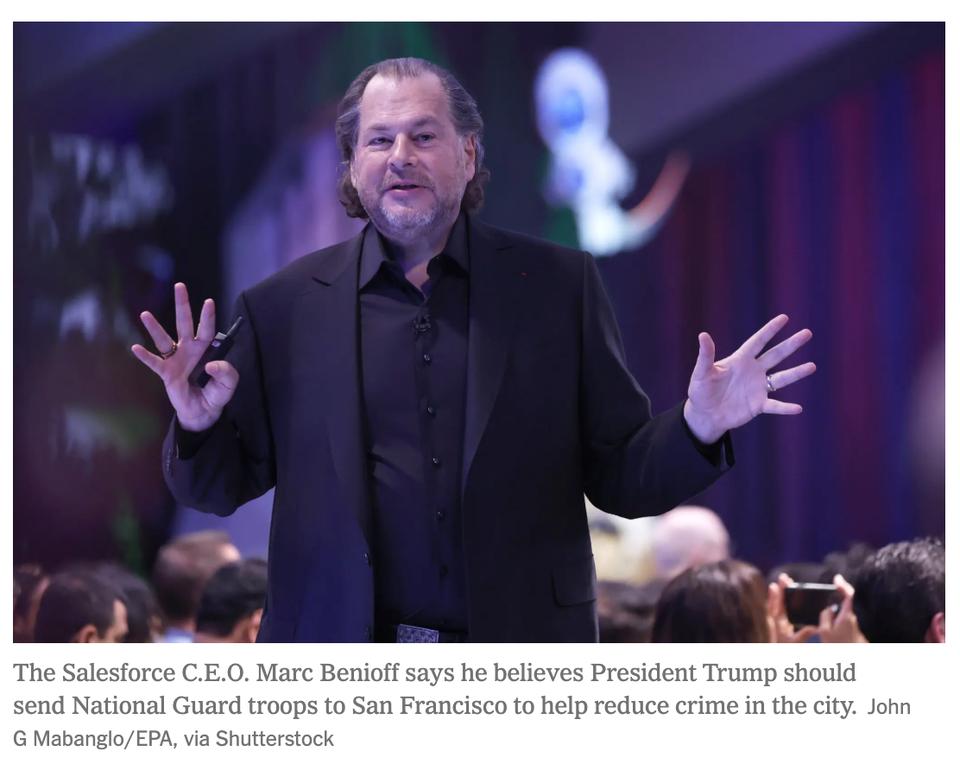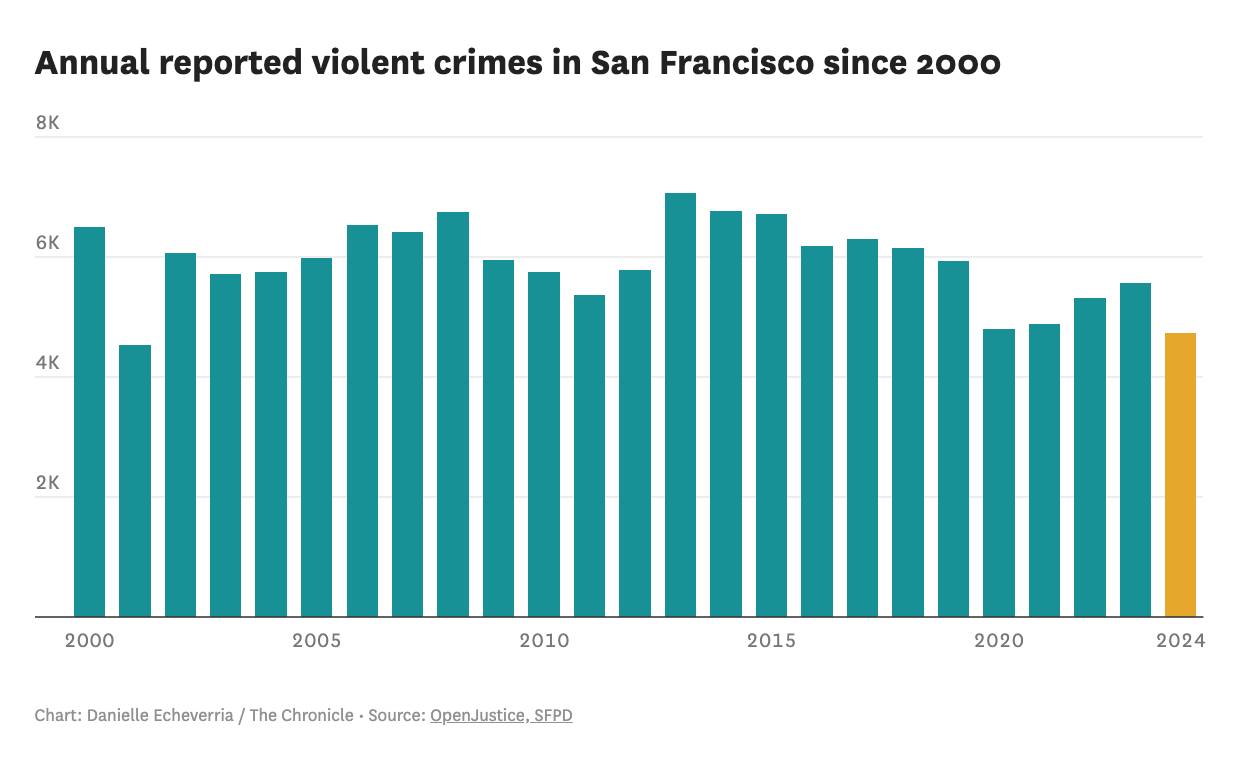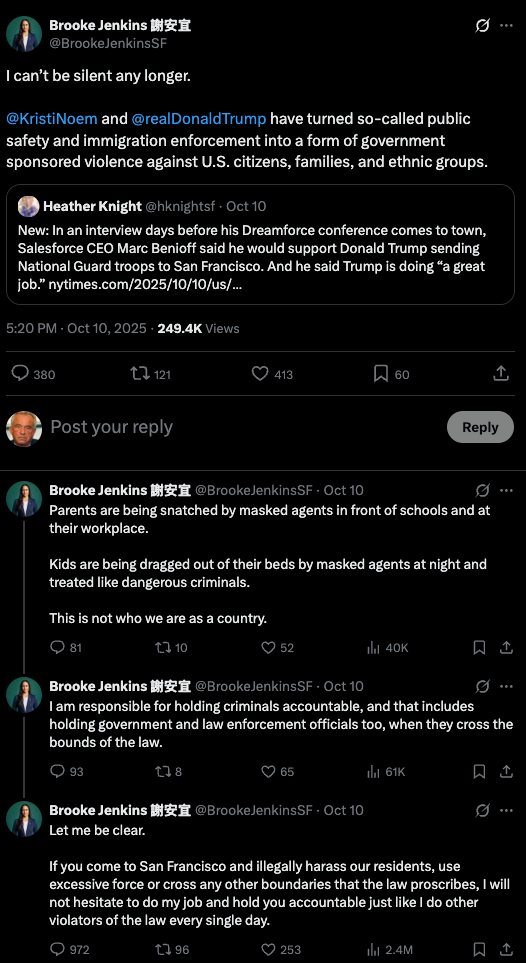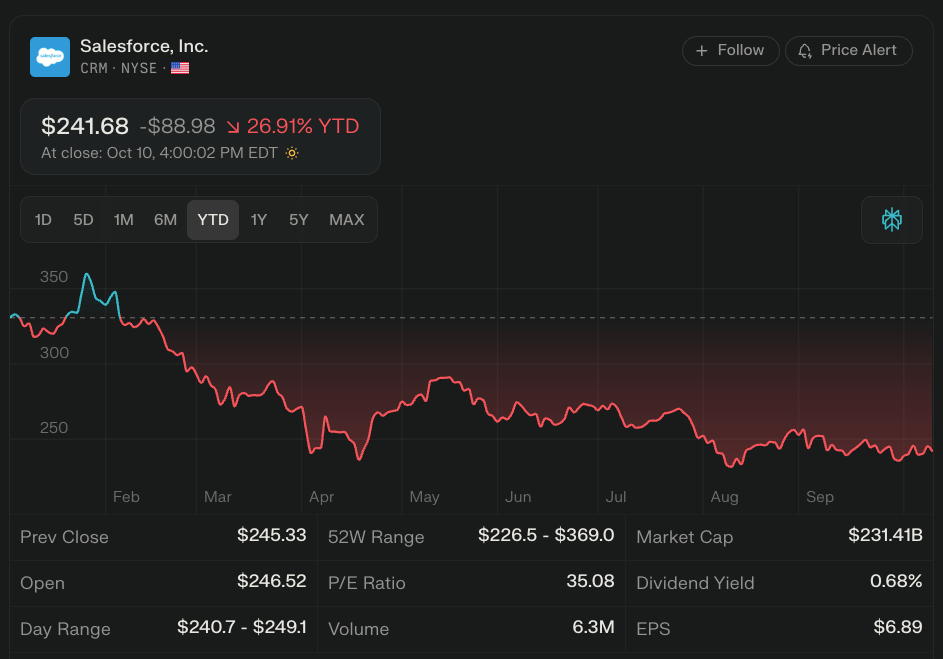Thoughts on Benioff’s “Musk Moment” and Why He’s a Civically and Intellectually Lazy, Hypocritical Piece of Shit

Mark Benioff, co-founder and CEO of Salesforce – the cloud-based, AI-powered CRM giant with more than 1,400 federal contracts – has joined the growing list of tech billionaires eager to bend the knee and bootlick President Trump. Once the poster-man for "compassionate capitalism," Benioff is now publicly supporting Trump's plan to send National Guard troops into San Francisco to "reduce crime."
This is the same Benioff who made his fortune in the early 2000s, catching the cloud-computing tiger by the tail, weathered the dot-com bubble bursting, and emerged from the 2008 crash thanks in part to the FED's low-interest windfall. Now, he apparently believes he can dictate solutions for a city he barely inhabits. And because his company occupies one of San Francisco's most recognizable towers – the rocket/dick-shaped Salesforce HQ that looms tilted over downtown San Francisco – his words matter.

In a recent New York Times interview, Benioff waxed nostalgic about the "good old days" of pre-tech-boom San Francisco, lamenting the city's decline and declaring that he "fully supports" Trump, whom he thinks is “doing a great job.” That statement alone was a shock, but makes sense considering the recent positions of Elon Musk and the rest of the “bro-ligarchy.” Yet his suggestion that National Guard troops should patrol San Francisco – clearly violating the Posse Comitatus Act – is a complete about-face from the philanthropist’s image he spent decades cultivating and marketing himself as.
Heather Knight, San Francisco bureau chief for The New York Times, noted that Benioff “tended toward the liberal side of Silicon Valley politics” and that he often lectured fellow executives on helping the homeless instead of complaining about them. So…what the hell happened? Perhaps the same transformation that’s overtaken much of big tech: proximity to political power is addictive, and loyalty to their bottom line trumps all else; social unrest, violence, or worse be damned.
Benioff’s barker-act endorsing Trump’s “law-and-order” schtick is even more dissonant given that San Francisco’s actual crime data doesn’t support his narrative. According to city statistics, violent and property crime are at their lowest levels in more than twenty years. WalletHub ranks San Francisco the ninth-happiest city in the country. Yet Benioff insists the town doesn’t have “enough cops,” and “more cops” would solve this obscure definition of “crime” he dropped on The City last Friday.

If the data doesn't justify Benioff’s stance, perhaps self-interest does. To be frank, that would be consistent with the above. Salesforce’s flagship conference, Dreamforce, is happening once again this year, and Benioff has already announced that 200 additional officers will be on hand for “safety.” The timing of Dreamforce all but suggests that Benioff’s willy-nilly comments seem less about really trying to solve civic decay and more about keeping his corporate spectacle free of protest, homelessness, and bad press while kicking the hornet’s nest of online discussion – as you’ve likely observed.
Benioff’s comments landed a week or so after Trump’s own inciting speech to US military leaders at Quantico. The president lazily rallied against “radical left” cities like San Francisco, as he did with Portland and Chicago, vowing to “straighten them out one by one.”
If you live in Chicago, it’s turned from cringe-worthy Truth Social posts from the president into reality, and when a billionaire like Benioff amplifies that rhetoric, it gives the administration — and its growing list of toadies — the social license to act on it.
The absurdity of calling for the National Guard becomes even clearer when compared to data: other states with far higher overdose rates and deaths, such as Tennessee, South Carolina, and Florida, haven’t been targeted for “cleanup.” So why San Francisco? Because it’s symbolic — progressive, diverse, and still a sanctuary city. Supporting a federal crackdown, there is a way to send a political message.
Tech peers like Garry Tan have blamed the city’s problems on “activist judges,” but Benioff’s approach is broader and more ominous, much like Trump’s recent memoranda, the National Security Presidential Memorandum-7 (NSPM-7). His vague talk of “reducing crime” also echoes Trump’s own language about “wars from within.” It’s a tactic of casting a wide net that will lead to even more rights taken away, and groups of people, not criminals, swept up in an all-or-nothing militarized response to theoretically “solve” problems literally every city has.

Benioff’s moral authority is questionable here. He doesn’t live in San Francisco full-time - he spends most of the year on Hawaii’s Big Island, where he’s purchased large parcels of land. His “safety concerns” ring hollow from that distance. When he does appear, usually for Dreamforce, he seems more frustrated with being inconvenienced by the city’s realities than committed to understanding them.
Benioff's remarks also reveal the contradictions of “compassionate capitalism" as Salesforce, quite publicly in the days of former Mayor Ed Lee, received generous tax breaks from the city and paid zero federal income taxes in 2020, despite reporting $2.6 billion in profits. Benioff and his now likely horrified PR team have built an image as a socially conscious mogul steeped in social media posts of him meditating and, most recently, celebrating the life of the late Jane Goodall. But when faced with inconvenience, unfavorable optics, or whatever else, his compassion seems to be running thin.
District Attorney Brooke Jenkins called his remarks “lividly disappointing,” warning they invite “chaos” and fear. “San Franciscans right now sit scared that we are next in line for what Trump is delivering to other cities,” she said. City spokesperson Charles Lutvak noted that “crime is down nearly 30% citywide and at its lowest point in decades.” Facts Benioff, the self-proclaimed data visionary, conveniently ignored.

Benioff’s remarks reflect a broader rightward drift in Silicon Valley. Once synonymous with libertarian innovation and social progress, many of today’s tech leaders are aligning themselves with Trumpism’s blend of authoritarian swagger and performative grievance. To them, “order” means control of labor, markets, narrative…whatever the people give us, they will clearly take it.
Like Facebook’s Mark Zuckerberg, who coined “move fast and break things,” Benioff and his peers move fast and break cities only to later lament what’s been lost. Their rhetoric about “cleaning up” urban spaces masks an anxiety about possibly losing dominance and social appeal. Aligning with Trump gives them a way to reassert both, while ironically, also appearing a little desperate.
Benioff’s influence is not trivial. Salesforce is a cornerstone of San Francisco’s economy and one of the largest federal tech contractors in the country. When its CEO calls for the National Guard, it carries political weight.
And the irony is thick. This is the same man who once claimed spiritual guidance from “The Hugging Saint,” and built his brand on empathy and connection, now echoing a president who weaponizes division. Managing a tech company is not the same as managing a city, but Benioff seems to have forgotten that he grew up designing video games to pay for college, and he helps businesses manage customer relationships to sell stuff.

But maybe that’s what has him throwing out nonsense like this? Perhaps he’s frustrated with declining Salesforce stock – down over 25% this year while competitors like Oracle surge – or anxious about his own public relevance as his biggest competitor, Larry Ellison, sees his company’s stock hit a new all-time high as he scoops up studios like Paramount, etc. At the same time, Benioff dresses up opportunism as civic concern, proving even more how disconnected he is to a city he used to call home.
Like Chicago, like LA, like Portland, San Francisco doesn’t need soldiers. It requires coordinated, transparent investment, a more stringent legal system that holds those who break the law accountable, empathy, and strong leadership who genuinely want to work to do the hard thing the right way. Benioff’s statements show how detached many tech titans have become in this respect: insulated by wealth, nostalgic, and wanting a quick fix for a past when they were, let's be real, younger, and seemingly uber-eager to trade ideals for future influence.
If you’re among the San Franciscans alarmed by Benioff’s comments and want to maybe hear directly from Mayor Lurie, who reportedly hates talking about Trump and topics like this, you can reach out to his office right here.
First published at BrokeAssStuart under Guest Writer/NotesontheWayOut





Member discussion